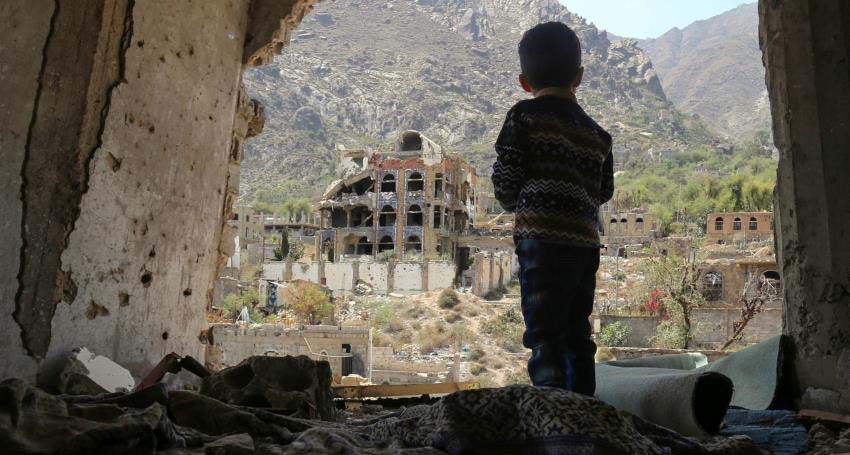A UN conference for Yemen on 1 March 2021 was a pivotal moment for governments to commit voluntary funds in support of the Yemeni people, who have already suffered through six years of a man-made catastrophe. With five million people currently teetering on the edge of starvation and over two-thirds of the country’s population in need of humanitarian aid or protection, the situation could not be more urgent.
Outcome of pledging event disappointing
The outcome of the pledging event has been described as “disappointing” by UN chief Antonio Guterres who announced that pledges totalled less than last year’s humanitarian response, and a billion dollars less than the figure raised in 2019. According to the UN, $3.85 billion are needed to avert large-scale famine, with only $1.7 billion committed at this point. In 2020, humanitarian funding was only half of what was needed, and only half the amount received the year before.
Despite ongoing humanitarian assistance, 16.2 million Yemenis are food insecure and the situation represents the worst humanitarian crisis in the world. Malnutrition rates among women and children remain among the highest worldwide, with 1.2 million pregnant or breastfeeding women and 2.3 million children under 5 requiring treatment for acute malnutrition.

“This is a disaster, this is a ticking time-bomb and the world needs to act now,” said Tomson Phiri, a spokesperson of the UN World Food Programme (WFP) at a press conference in Geneva three months ago.
Aiming to feed 13 million of the most vulnerable people each month, WFP’s emergency response in Yemen is the largest anywhere in the world. The humanitarian situation in Yemen is extremely fragile and any disruption in the pipeline of critical supplies such as food, fuel and medicines has the potential to bring millions of people close to starvation and death.
According to the UN’s refugee agency UNHCR, a UN food security survey in Yemen showed in December that the risk of “famine-like” conditions was increasing. With the humanitarian response underfunded, no improvement is in sight.
The UN is not independent
The case of Yemen exposes the UN’s impotence and major flaws in how the world is governed. The people of Yemen are not at risk of starvation because the people of the world wish them to starve but due to the dynamics and structure of the international system. None of the world’s sovereign states serves the common interest of humanity. Their goal is to protect their national interest in a competitive world, not bound by enforceable rules to address climate change, nuclear proliferation and even a basic human right as food.
The UN and its entities are not independent organizations to deal with matters of global concern but merely instruments of member states. They have no independent funding sources to carry out their operations and are almost entirely dependent on member state contributions. In the case of humanitarian assistance, these are voluntary.
The Committee on World Food Security
Further, the most vulnerable need a stronger voice at the global stage. In the area of food policy, the efforts undertaken by the Committee on World Food Security (CFS) have been very promising. Set up at the World Food Conference in 1974, the Committee has adopted a multi-stakeholder approach that brings together a wide variety of stakeholders from UN institutions, NGOs, research institutes, philanthropic foundations and governments.
Despite its success in placing deliberation of global food policy on a broad foundation, more work needs to be done to involve elected parliamentarians and to promote institutional reform. Civil society organizations have also expressed concern that corporations, states and people are given an equal voice, blurring the difference between public and private interests.
The funding mechanism is a key issue, too. Due to lack of voluntary contributions, the Committee has been underfunded and running deficits.
A democratic world federation
Ultimately, we must overcome competition between sovereign nations and put the common interest of humanity and the needs of the most vulnerable center-stage. The way to achieve this and to address global challenges such as starvation and climate change efficiently is to create a democratic world federation with accountable governance at every level from local to global.
This includes the possibility of setting up independent funding sources, for instance through global taxation. Considering how our collective well-being is now dependent on the secure provision and the regulation of public goods systems that are global in scope, attaining the necessary funds to address these goals is crucial and making this dependent on the political will and resources of nation-states will not suffice.
Pragmatic steps need to begin
Of course, the Yemeni people cannot wait for world federation, and urgent action must continue to avert the immediate crisis.
At the same time, pragmatic steps towards institutional change are possible. There are challenges to this proposal, but setting up a United Nations Parliamentary Assembly (UNPA) has won widespread political support from parliamentarians, non-governmental organizations, and dedicated citizens.
The intention is that a UNPA will act as an independent watchdog in the UN system and as a democratic reflection of the diversity of world public opinion through citizen-elected representatives who are not answerable to governments.
This assembly will allow giving a stronger global voice to those affected by hunger and malnutrition, and to small farmers, among others. It represents the nucleus of an actual global parliament.
The world is in dire need of an engine to promote political change and help overcome decades of impasse. It requires an institutional path that leads to a peaceful, just and sustainable world. A UNPA could be this engine – as the more we defer embarking on a more viable solution, the longer it will be before we prevent situations like the humanitarian crisis in Yemen arising with competing sovereign nations remaining to prevaricate on existential challenges.





